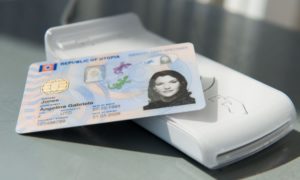
Each month in the UK there are over 34,000 Google searches relating to UK national ID cards even though they doesn’t exist. The British have always had a strong attitude to national identity cards. The threat of the government watching your every step like George Orwell’s 1984 is all many think about whenever the idea is proposed.
The possibility of a card last reared its head in 2006 when the government of the day passed the Identity Cards Act, citing the need to combat illegal immigration, welfare fraud, identity fraud and to tackle terrorism.
The proposed cards would have held 50 categories of identifiers including fingerprints, a facial scan, and past places of residence. It would have linked to the UK’s National Insurance number (the British social security number), and permit travel to the European Union. And it would all be stored on a National Identity Register.
However, there was widespread concern about the scheme from privacy experts, human rights lawyers, activists, security professionals and IT experts. It was scrapped in 2010 and the register was destroyed. “Cancelling the scheme and abolishing the National Identity Register is a major step in dismantling the surveillance state.” said Deputy Prime Minister Nick Clegg at the time in May 2010.
Public sentiment continues to oppose the idea of a national ID scheme in the UK, even if over 100 other countries already use them. We explained in a prior post about why 1984 never came to pass, but it’s curious why the British public do not trust any government to securely look after their most personal data.
These fears are not prevalent in many parts of Europe. Taking Belgium as an example, their national ID card has streamlined access to many government services. This includes online tax services, police reports, changes of address and requests for certificates (including birth). Each card holder has an individual PIN for authentication, and the card generates a legally recognized signature.
The UK has created an authentication scheme that lays the framework for accessing a wide range of government services online. But it has yet to tie them to an ID card. Given citizens’ records are already aggregated anyway, the resistance to a physical ID card may actually be nothing more than a symbol the British public cannot let go of.
Some object to the idea that people would have to have a document to prove who they were – as if they can’t be trusted to tell the truth. This is another quirk of British life as the driving license has become a de facto British ID document able to verify identities in banks, entertainment venues, post offices, and even some government services.
Non-EEA residents in the UK also have an ID card issued by Government authorities to provide temporary residence entitlement of a number of years. It embeds a contactless micro-controller that securely stores biometric data to simplify residency entitlement verification. It also stores ID data for social security and tax affairs. The contactless interface is mandatory and meets the same standards as biometric ePassports.
As the efficiency and convenience of accessing services online through a single-sign in become harder to ignore, we may see a shift in attitudes. Indeed, those countries without a national ID card now number less than ten. As long as security and transparency is guaranteed, the benefits far outweigh the fears of an overreaching state.
What do you think about national ID cards? Do you live in a country where you have one? Are they useful, or do you wish you could get rid of it? Let us know in the comments below.


